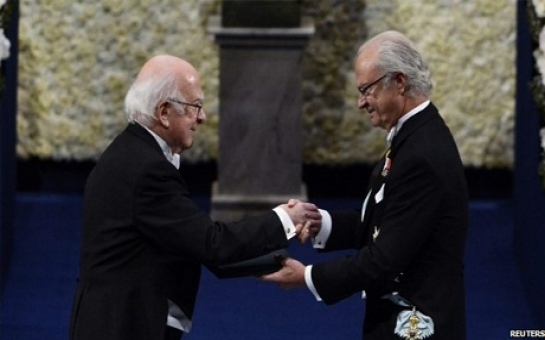Follow us !
Nobel prizes are for 'best of best'
World
22:00 | 28.12.2013

Nobel prizes are for 'best of best'
The President of the Royal Society says the system of selecting Nobel Prize winners should not be changed, amid pressure from some who want reform.Sir Paul Nurse said the prize should continue to reward select individuals, not teams or organisations.His comments come at a time when some say that Cern should have been included in this year's physics prize.Thousands of researchers at the Large Hadron Collider had been involved in the discovery of the Higgs in 2012."There are often big teams involved, but recognising individuals does have an impact that I'm afraid recognising groups or individuals does not," he told BBC News.Earlier this month, Profs Peter Higgs and Francois Englert received their Nobel Prizes from the King of Sweden at a ceremony full of pomp and ceremony. Yet there were four others who contributed significantly toward a theory to explain how elementary particles came to have mass. The theory has come to be known as the Higgs mechanism.'Rock star'In April 2013, one of them, Prof Carl Hagen, told BBC News that, when the discovery was announced at Cern, Peter Higgs had been "treated like a rock star" by fellow scientists "while the rest of us were barely recognised".Prof Hagen commented well before the winners of this year's Nobel Prize for physics were announced that he did not mind if he did not win the award."But by awarding it to some sub-set you detract from the fact that we all contributed in some very important way to this discovery," he said.Some have argued that the system of awarding Nobel Prizes should be changed, even though it is a statute of the Nobel Foundation that the prize should be given to no more than three individuals. The science prizes have not been given to an organisation. Some had argued that this too should be reconsidered in the light of the fact that thousands of scientists at the Large Hadron Collider, which is operated by Cern in Geneva, had helped to discover the Higgs particle, which was the trigger for the physics prize being awarded to Peter Higgs and Francois Englert.US science blogger Dr Ash Jogalekar argues that Cern should also have been acknowledged by the Nobel prize committee."I think it is time they changed the model," he told BBC News."When the Nobel Prize was set up by Alfred Nobel 113 years ago, science was done very differently. It was done mostly by individuals, there was very little international collaboration and it was done very cheaply."But it has radically changed. A lot of cutting edge science, a lot of work on the most important problems in science is a team effort. It is done by large interdisciplinary teams."Prof Sir Paul Nurse, a Nobel Prize winner himself, agrees that Dr Jogalekar's argument "makes sense".But there is a "but"."When you are on the platform and you are shaking hands with the King of Sweden and the cameras are all on you, you would not be able to recognise Cern. If there were 20 of you, it would lose the kudos of the one, two or three people that are actually there," according to Prof Nurse.Rewarding creativityProf Sir John Walker won his Nobel Prize in 1997 agrees. He says it is individual creativity that drives scientific discovery and inspires others."I was surrounded by Nobel Laureates in Cambridge. One in particular influenced me and that was Frederick Sanger. I went and discussed (my ideas) with Sanger and he said why didn't you get on with it and so I did and it set the course of my life for the next 35 years," he explained.The largest concentration of Nobel prizes in the UK is at Cambridge - with more than 50 winners of the three science prizes. It is for this reason that many high technology companies base themselves in the area, according to Laurent Jespers of the multinational drug company GSK."There are about 1,400 technology companies in Cambridge," he says."If you put that into context, approximately 50 years ago, there were only 39 tech companies. So it is a massive expansion in tech companies that have attracted large pharma and large computer companies, as well as small companies."That is a view echoed by Dr Jane Osbourn, director of another multinational, Astra Zeneca, which has decided to base its research efforts in Cambridge."Astra Zeneca has given a lot of thought about where they place their investment in research and development and we have taken a very active decision to maintain our R&D base in the UK because we see great value in the early research and understanding of biology that comes out of our UK universities and hospitals," she said."We have chosen Cambridge, in particular, because of the interdisciplinary expertise in a close, packed environment... and this great tradition of Nobel prize winning work."The Nobel Prizes in research are of tremendous economic benefit. But, according to Prof Nurse, it brings much more to a nation."It gets the kudos of a country that is good at science. Secondly, we are making additions to the world's culture. Would you ask what the value of Shakespeare was? It is part of our island's story," he says.(BBC reported)ANN.Az










